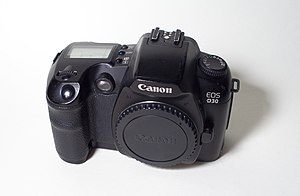Canon EOS D30: Difference between revisions
Add wikilink to Canon_BG-ED3 |
Correct the Optional Battery Template section from BP-511 to BP-511A, as BP-511 is listed in the Battery section and it is the A model that is "optional". |
||
| Line 26: | Line 26: | ||
weight = 780 g (body only) | |
weight = 780 g (body only) | |
||
battery = Li-Ion BP-511 rechargeable| |
battery = Li-Ion BP-511 rechargeable| |
||
obp = BP- |
obp = BP-511A, [[Canon_BG-ED3|BG-ED3]] [[battery grip]]| |
||
madeIn = [[Japan]]| |
madeIn = [[Japan]]| |
||
}} |
}} |
||
Revision as of 07:59, 17 March 2011
 | |
| Overview | |
|---|---|
| Type | Single-lens reflex |
| Lens | |
| Lens | Interchangeable (EF) |
| Sensor/medium | |
| Sensor | CMOS |
| Maximum resolution | 2,160 x 1,440 (3.1 megapixels) |
| Film speed | 100-1600 in 1 EV steps |
| Storage media | CompactFlash(CF) (Type I or Type II) and MicroDrive(MD) |
| Focusing | |
| Focus modes | One-shot, AI-Servo, AI-Focus, Manual |
| Focus areas | 3 points (1 + 1) |
| Focus bracketing | none |
| Exposure/metering | |
| Exposure modes | Full auto, programmed, shutter-priority, aperture priority, manual |
| Exposure metering | TTL, full aperture, zones |
| Metering modes | Evaluative, Center Weighted, Average |
| Flash | |
| Flash | built-in, pop-up |
| Flash bracketing | none |
| Shutter | |
| Shutter | electronic focal plane |
| Shutter speed range | 30 to 1/4000 s |
| Continuous shooting | up to 3.0 frame/s, max 8 frames |
| Viewfinder | |
| Viewfinder | Optical |
| Image processing | |
| White balance | 7 presets, including Auto and custom |
| WB bracketing | none |
| General | |
| LCD screen | 1.8 in (46 mm), 114,000 pixels |
| Battery | Li-Ion BP-511 rechargeable |
| Optional battery packs | BP-511A, BG-ED3 battery grip |
| Weight | 780 g (body only) |
| Made in | Japan |
The Canon EOS D30 is a discontinued 3.1-megapixel professional digital single lens reflex camera (DSLR) body, initially announced by Canon on May 17, 2000. It is part of the Canon EOS line of cameras and uses the EF lens mount. The EOS D30 was Canon's first "home grown" digital SLR[1]. Before that point Canon had a contract with Kodak to rebrand the Kodak 2-megapixel DCS 520 as Canon EOS D2000 and the 6-megapixel DCS 520 as Canon EOS D6000 digital SLRs, which combined Kodak digital backs and Canon camera bodies[2].
The D30 was aimed at the prosumer market, and was intended to occupy the gap between the high-end consumer-market Canon PowerShot Pro70, and Canon's first professional digital SLR, the Canon EOS-1D[citation needed], which was released in November 2001. Due to the D30's release date, reviews frequently compared the D30 to the Nikon D1[2][3], which was aimed at the professional market.
The D30 was succeeded by the 6.3-megapixel D60 in 2002.
Features
- 22.7 x 15.1 mm CMOS sensor (APS-C)
- 3.1 megapixel effective (3.3 megapixel total)
- Max resolution 2160 x 1440
- FOV crop (1.6x)
- Canon EF lens mount (excludes EF-S)
- 3-point auto focus
- 100, 200, 400, 800, 1600 ISO speed equivalent
- 30 to 1/4000 s shutter speed and bulb
- TTL 35 zone SPC metering: evaluative, center weighted, partial
- Exposure compensation -2 EV to +2 EV in 1/3 EV or 1/2 EV steps
- Auto White Balance (plus 5 positions & manual preset)
- Eye-level pentaprism viewfinder
- 1.8 in (46 mm) color TFT liquid-crystal monitor
- E-TTL flash mode
- Built-in Flash
- 3 frames per second continuous shooting (max. 8 frames)
- Dimensions (WxHxD): 150 x 107 x 75 mm
- Weight (body only): 780 g
- Optional BG-ED3 battery grip
References
- ^ "Canon EOS D30 Digital SLR". imaging-resource.com. August 27, 2000. Retrieved 19 November 2009.
- ^ a b "Canon EOS D30". Steves Digicams. October 27, 2000. Retrieved 19 November 2009.
- ^ Askey, Phil (October 2000). "Canon EOS-D30 Review". dpreview.com. Retrieved 19 November 2009.
External links
![]() Media related to Canon EOS D30 at Wikimedia Commons
Media related to Canon EOS D30 at Wikimedia Commons
